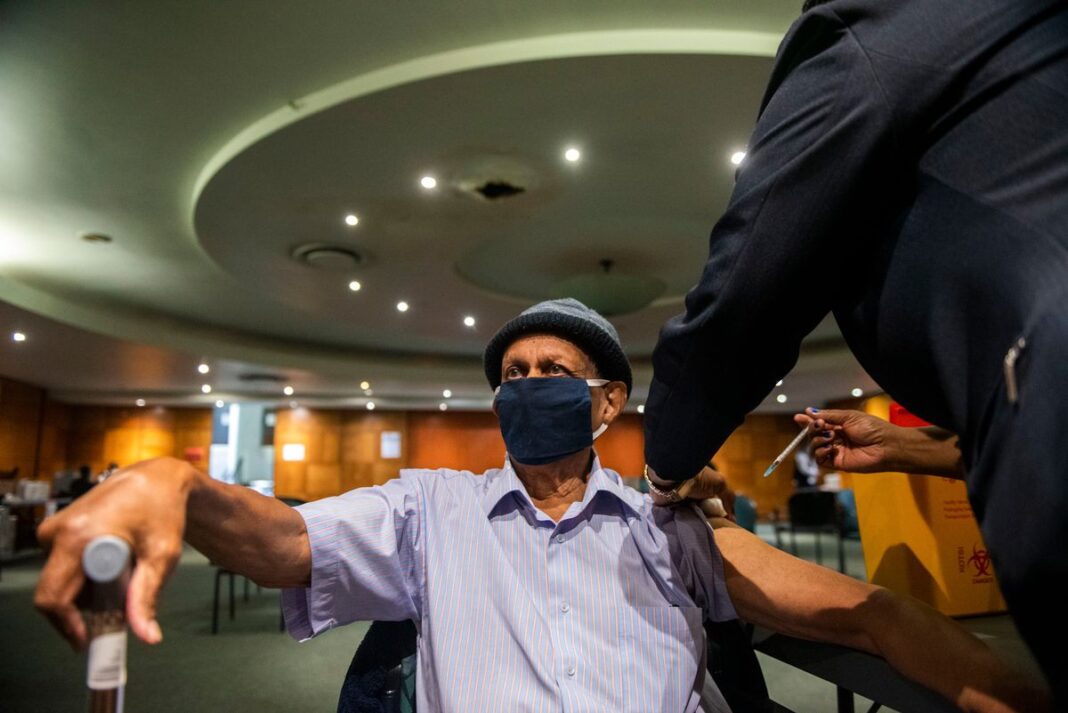SOUTH Africa’s national Covid-19 vaccine rollout has run for just over three weeks, yet one of the country’s long-standing challenges is already hampering efforts to inoculate two-thirds of the population this year: inequality.
People over 60 years old are eligible for Covid-19 shots during the current phase of the plan, which began May 17 following the delayed arrival of doses from BioNTech SE and Pfizer Inc.
Yet registration for a shot can only be done online or by mobile phone, potentially excluding those without the right tech or someone to help them.
The process is also in English, just one of the country’s 11 official languages.
While it’s a widely understood second language, only a little over 8% of households speak it at home, according to Statistics South Africa.
The setup also favors those with private health insurance, or about 16% of the population, who tend to be higher earners.
“We really need to guard against this notion that some people are more important than others,” said Fatima Hassan, founder and director of the Health Justice Initiative, a non-profit that seeks equality in health-care provision.
“You don’t distinguish between public and private and don’t distinguish between people who have money and don’t have money.”
South Africa is one of the most unequal countries in the world, a situation that’s worsened since the end of apartheid almost three decades ago, according to the International Monetary Fund. The top 20% of the population receive more than 68% of income, compared with 47% for an index of emerging markets, data published by the institution in 2020 show.
Inequality within South Africa reflects a global problem. Wealthy countries like the U.S. and the U.K. have a surplus of doses and are considering extending them to under-18s, while vast swathes of the world have inoculated tiny percentages of their population. That’s heightened the risk of the emergence of new coronavirus variants that could prove resistant to current vaccines.
Covax, an initiative to ensure equitable access backed by the World Health Organization, has struggled to secure and distribute sufficient doses, leaving poorer countries far behind.
About 5% of South African adults don’t have access to a mobile phone, while a further 8% share one, according to research by Geopoll. Digital access was also an issue in virus-ravaged India, where an over-reliance on an app-based technology made it hard for poor and rural citizens to sign up for vaccines.
“A significant number of the elderly have encountered difficulties,” South African President Cyril Ramaphosa said in an address to the nation on May 30, highlighting the technology and language limitations. “We are working to get around these problems.”
With just under 2.4 million South African over-60s registered as of June 5, or less than half of that age group, more needs to be done to get vaccines to the vulnerable and elderly, said Hassan.
“In rural, neglected and hard-to-reach areas you do need mobile vaccination sites and also door-to-door” service, she said. The vaccine campaign should “subsidize transport, have sites closer to where people are, use churches and other places where people go.”
Discovery Ltd., which owns the country’s biggest medical-aid provider, receives doses directly from Pfizer rather than from a central distribution center used by public-sector sites, and has as much as five days supply at any given time.
The group’s head office in the Johannesburg financial district of Sandton is vaccinating about 2,500 people a day, according to Ron Whelan, head of Discovery’s Covid-19 task team. That compares with about 650 at a tented site outside Chris Hani Baragwanath Hospital in Soweto, an area reserved for Black people during apartheid.
Administrators in Soweto were closing the venue at 2 p.m. due to limited supplies, they told Bloomberg on May 27, even as people were still arriving. They don’t know when the situation will improve.
Still, the complex rollout is underway. Almost 864,000 people had received their first of two Pfizer doses as of Monday morning, while 480,000 health workers were given the single-shot Johnson & Johnson version as part of a trial.
South Africa has received about 2.7 million Pfizer vaccines to date, with batches from a 21-million order expected to arrive at regular intervals.
The country is also awaiting a decision from the U.S. Food and Drug Administration on the viability of J&J doses that may have been contaminated at a factory in the U.S.
Should they be approved for use, the distribution of the first portion of a total 31 million doses can get underway. They are earmarked for more rural areas as they don’t need to be kept at extremely cold temperatures like the Pfizer version.
The vaccine rollout is “gaining momentum,” Vusi Mazibuko, a regional health chief for the City of Johannesburg, said outside a sports center in the township of Alexandra, where a small site is administering about 180 doses a day.
Officials in the impoverished district just a few miles from Sandton are spreading the word via community radio, he said, telling listeners how to register and where to register and where to go.
Most public centers are allowing people to be vaccinated without being sent an appointment time, as long as they are registered.
This has even attracted Discovery members to the likes of Alexandra, said Louis Weinberg, 65, who was at the local community health center with his wife and her 93-year-old mother.
“We heard it was really good and well organized,” he said in a line that snaked down the street outside the venue, adding the private insurer doesn’t allow walk-ins.
But allowing people to show up without a time only adds to the issue with equality, said Hassan.
“Walk-ins are happening for people who drove around and pitched up at a particular facility and waited because they could afford to,” she said.
“It prejudices the oldest people who have no resources, who have to catch multiple buses or taxis or cars and people who have very little access to the information or internet.”
- Bloomberg

